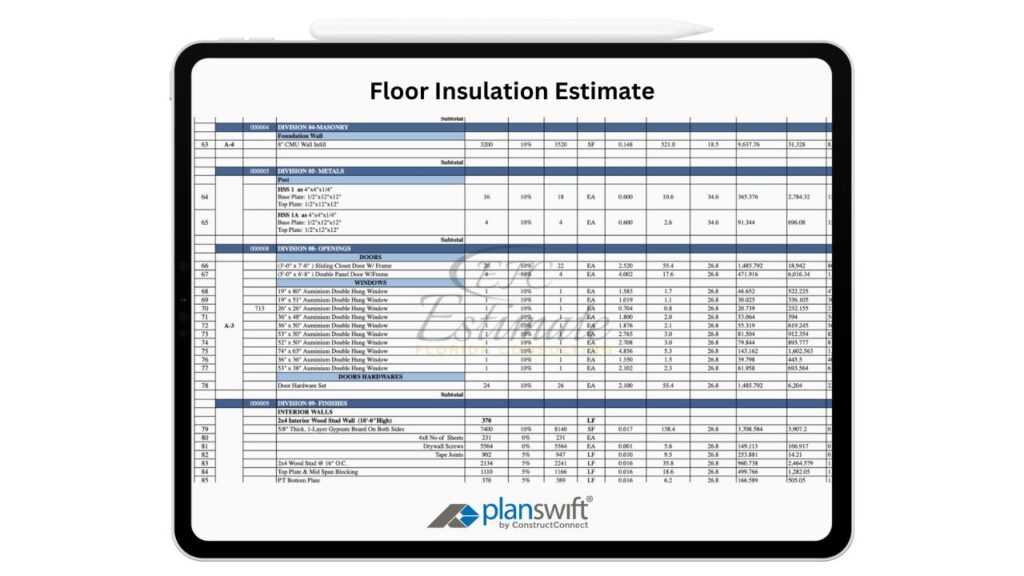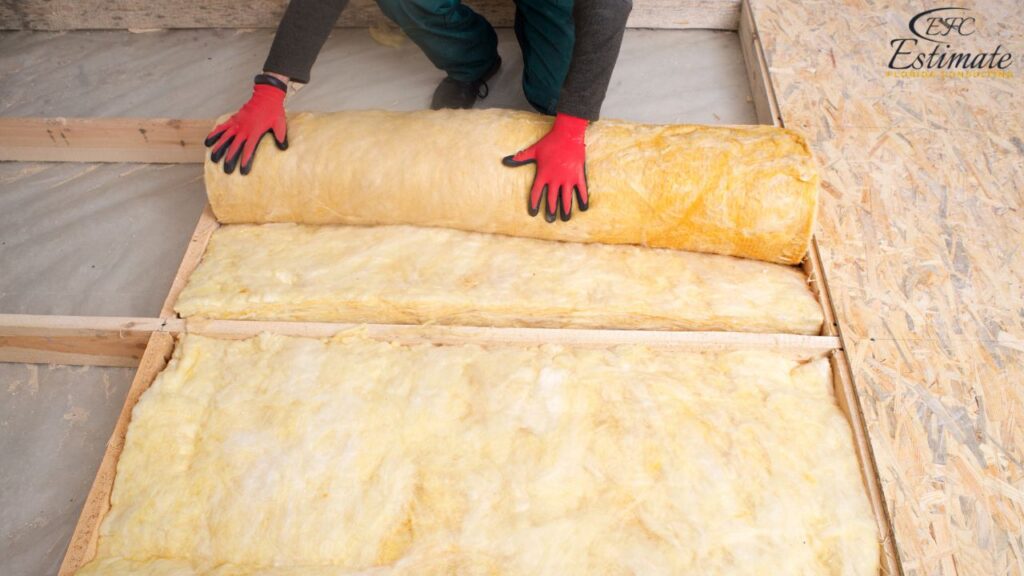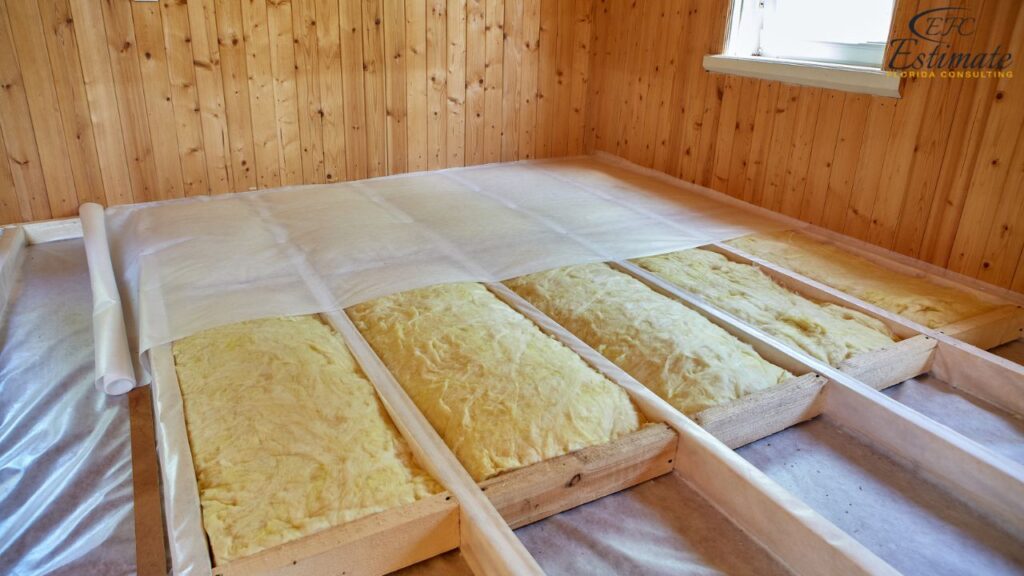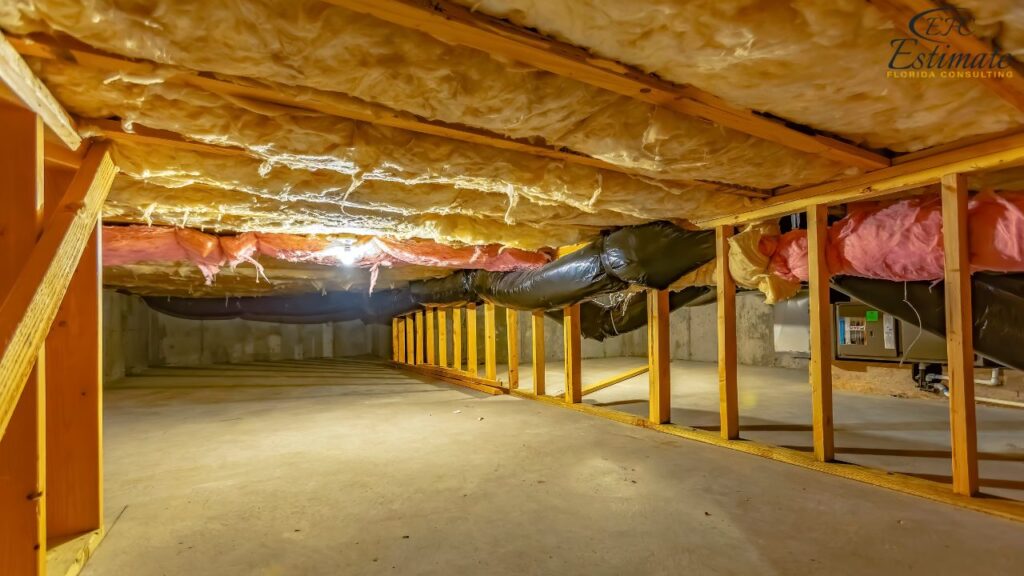90% More Chances to Win Projects With Our Estimate!
- Multi-Family Building
- Hotel Building
- Hospital Building
- Warehouse Building
- School & University Building
- High-Rise Building
- Shopping Complex
- Data Center Building

Floor insulation is a critical aspect of building energy efficiency, offering improved indoor comfort, lower energy bills, and a healthier living environment. Whether you’re working on a new construction project or looking to retrofit an older home, understanding the costs associated with floor insulation is key to making informed decisions. Effective floor insulation reduces heat loss, prevents cold drafts, and provides moisture control, making it an essential investment for any property. In this guide, we’ll explore the detailed costs, types of insulation materials, labor expenses, and how to achieve long-term savings by using floor insulation cost estimators.

Floor insulation plays a vital role in maintaining a home’s energy efficiency. Properly insulated floors can prevent significant heat loss during the colder months and reduce heat gain in warmer climates, leading to substantial savings on energy bills. Without adequate insulation, heat can escape through the floors, forcing heating and cooling systems to work harder and consume more energy. In fact, floor insulation can reduce energy consumption by up to 20-30%, making it an important component of sustainable home design. Additionally, insulated floors help create a more consistent indoor climate, reduce drafts, and prevent moisture buildup, leading to improved comfort and air quality inside the home.
Several factors directly impact the overall cost of floor insulation, and understanding these factors will help you accurately budget for your project. From the size of the area to the type of insulation material you choose, each factor contributes to the total cost.
The size of the area to be insulated is the most significant factor influencing the cost of floor insulation. Larger spaces require more materials and labor, driving up the overall cost of the project. For example, insulating a small crawl space is generally more affordable than insulating a large open floor area in a residential home. Additionally, larger areas may benefit from bulk pricing on materials, which can slightly reduce the cost per square foot. Floor insulation typically costs between $2.88 and $7.20 per square foot, depending on the material and the structure of the floor.
The type of insulation material you choose has a major impact on the total cost. Different materials provide varying levels of thermal resistance (R-value), durability, and ease of installation. Affordable materials such as fiberglass or cellulose are often preferred for budget-conscious projects, while premium materials like spray foam or rigid foam boards provide superior insulation but come at a higher cost. For instance, fiberglass insulation costs between $2.16 and $3.60 per square foot, while spray foam insulation can range from $5.76 to $8.64 per square foot. Your choice of material will depend on your budget, climate, and energy efficiency goals.
The complexity of the installation process can also significantly affect the total cost. Simple installations, such as insulating a suspended timber floor, are generally more affordable than more complicated projects like insulating a solid concrete floor or crawl space. Complex installations may require additional labor, specialized tools, or even structural modifications, all of which increase the overall project cost. Labor costs for floor insulation typically range from $1.44 to $4.32 per square foot, depending on the type of floor and the difficulty of the installation.
Your geographic location and the local climate also play a role in determining insulation costs. Homes in colder regions often require thicker insulation to prevent heat loss, which increases both the material and labor costs. Additionally, labor rates vary by region, with urban areas generally having higher labor costs compared to rural regions. In colder climates, insulation costs can rise to $3.60 to $8.64 per square foot, depending on the insulation material and the local labor market. However, the energy savings achieved from proper insulation in colder climates can often offset these higher upfront costs over time.
Many local building codes have specific requirements for insulation, particularly in areas that experience extreme weather conditions. Compliance with these codes may necessitate the use of thicker or more specialized insulation materials, which can add to the overall cost. Failure to meet these standards can result in fines or costly delays, so it’s important to ensure that your insulation project is up to code. Additionally, energy-efficient homes that meet building code standards often qualify for tax rebates or incentives, which can help offset some of the costs.

Each type of insulation material offers unique benefits in terms of thermal resistance, ease of installation, and moisture control. Below is a detailed cost breakdown for the most common floor insulation materials, including their respective R-values (a measure of thermal resistance) and total project costs for a typical floor.
Insulation Material | Cost (Per Square Foot) | R-Value Per Inch | Total Cost for 1,500 sq. ft. Floor |
Fiberglass Insulation | $2.16 – $3.60 | 2.9 – 3.8 | $3,240 – $5,400 |
Spray Foam Insulation | $5.76 – $8.64 | 6.0 – 7.0 | $8,640 – $12,960 |
Rigid Foam Board | $4.32 – $7.20 | 3.8 – 6.5 | $6,480 – $10,800 |
Cellulose Insulation | $2.88 – $5.76 | 3.2 – 3.8 | $4,320 – $8,640 |
Radiant Barrier Insulation | $1.44 – $2.88 | N/A | $2,160 – $4,320 |

Fiberglass insulation is one of the most cost-effective and commonly used materials for insulating floors. It is widely chosen for its affordability, ease of installation, and good thermal resistance. Fiberglass insulation is ideal for insulating open joist spaces or crawl areas, where it can be easily placed between the floor joists. Fiberglass insulation typically costs between $2.16 and $3.60 per square foot, providing an R-value of 2.9 to 3.8 per inch. For a standard 1,500 square foot floor, the total cost ranges from $3,240 to $5,400, making it an excellent choice for homeowners seeking a balance between cost and performance.
Spray foam insulation is highly effective at sealing air leaks and providing maximum thermal resistance. It expands to fill cracks and crevices, creating an airtight seal that prevents energy loss. This makes spray foam insulation ideal for floors that require superior insulation, especially in homes with irregular structures or hard-to-reach areas. Spray foam insulation costs between $5.76 and $8.64 per square foot, with an R-value of 6.0 to 7.0 per inch, which is one of the highest among insulation materials. For a 1,500 square foot floor, the total cost typically ranges from $8,640 to $12,960, making it a premium option for homeowners who want the best performance.
Rigid foam board insulation is a durable and moisture-resistant option that provides excellent thermal resistance. It is commonly used in floors that are prone to moisture or temperature fluctuations, such as basements and crawl spaces. Rigid foam boards offer a high R-value per inch, making them one of the most efficient insulation materials for floors. Rigid foam board insulation costs between $4.32 and $7.20 per square foot, with an R-value of 3.8 to 6.5 per inch. For a 1,500 square foot floor, the total cost ranges from $6,480 to $10,800, making it an ideal choice for areas where moisture protection is a priority.
Cellulose insulation is an environmentally friendly option made from recycled paper products. It is treated with fire-retardant chemicals and provides good thermal resistance, making it a popular choice for homeowners seeking sustainable insulation solutions. Cellulose is often blown into attics, walls, and floors, where it settles into cracks and gaps, creating an effective barrier against heat loss. Cellulose insulation costs between $2.88 and $5.76 per square foot, with an R-value of 3.2 to 3.8 per inch. For a 1,500 square foot floor, the total cost typically ranges from $4,320 to $8,640, making it a cost-effective and eco-friendly insulation option.
Radiant barrier insulation works by reflecting heat rather than absorbing it, making it ideal for homes in warmer climates where reducing cooling costs is a priority. While it doesn’t have an R-value like other insulation types, radiant barriers are highly effective at reducing heat gain through floors, helping to keep indoor temperatures lower during hot weather. Radiant barrier insulation costs between $1.44 and $2.88 per square foot, with total costs for a 1,500 square foot floor ranging from $2,160 to $4,320, making it an affordable and efficient option for homes in warm regions.
The complexity of the insulation installation has a direct impact on labor costs. Some types of insulation are easier and quicker to install, while others require specialized tools, equipment, or access to hard-to-reach areas. Below is a breakdown of the labor costs associated with installing different types of floor insulation.
Insulation Type | Labor Cost (Per Square Foot) |
Fiberglass Insulation | $1.44 – $2.88 |
Spray Foam | $2.88 – $5.76 |
Rigid Foam Board | $2.16 – $4.32 |
Cellulose | $1.44 – $3.60 |
Radiant Barrier | $0.72 – $2.16 |
Fiberglass insulation is one of the easiest materials to install, making labor costs relatively low compared to other options. It can be installed by placing batts between floor joists, which can be done quickly and with minimal tools. Labor for fiberglass insulation typically costs between $1.44 and $2.88 per square foot, depending on the complexity of the installation and the size of the project. This makes it an excellent option for homeowners looking for affordable and quick installation.

Spray foam insulation requires specialized equipment and trained professionals to ensure proper application, which increases labor costs. The process involves spraying foam into cavities and gaps, where it expands to fill the space completely, providing an airtight seal. Labor for spray foam insulation typically ranges from $2.88 to $5.76 per square foot, reflecting the precision and expertise required for this type of insulation.
Rigid foam board insulation is more labor-intensive to install, particularly in areas with tight or irregular spaces. The boards must be cut and fitted precisely, and extra care is needed to seal the edges properly. Labor costs for rigid foam board installation typically range from $2.16 to $4.32 per square foot, making it a slightly more labor-intensive option than fiberglass or cellulose.
Blown-in cellulose insulation requires the use of professional equipment to ensure that the material is evenly distributed and properly settled in the floor cavities. This process requires experienced installers to manage the equipment and ensure proper coverage. Labor costs for cellulose insulation generally range from $1.44 to $3.60 per square foot, depending on the accessibility of the space and the complexity of the project.
Radiant barriers are relatively easy to install, especially in open spaces. Since they are installed under floors or in crawl spaces to reflect heat, the labor required is minimal compared to other insulation types. Labor costs for radiant barrier installation typically range from $0.72 to $2.16 per square foot, making it one of the more affordable options for reducing heat gain in warm climates.
At Estimate Florida Consulting, we specialize in providing detailed and accurate cost estimates for all types of floor insulation projects. Whether you are insulating a new build or retrofitting an older home, our team of professional estimators will help you create a precise budget based on your specific project needs. We use state-of-the-art tools to assess material costs, labor expenses, and local factors that influence insulation costs, ensuring that you receive a comprehensive estimate that’s tailored to your project.
Our services include:
Contact Estimate Florida Consulting today to learn more about how we can help you achieve an energy-efficient and cost-effective floor insulation project.

Floor insulation is one of the most effective ways to improve your home’s energy efficiency and comfort while reducing energy bills. Understanding the factors that affect insulation costs—such as the size of the floor, the type of insulation material, installation complexity, and your geographic location—will help you create a realistic budget for your project. By choosing the right materials and working with experienced professionals, you can ensure that your floor insulation project is both affordable and efficient.
The cost of floor insulation typically ranges between $2.88 and $7.20 per square foot, depending on the type of material, the complexity of installation, and the geographic location. This includes both material and labor costs, which can vary based on the specific project.
For a 1,500 sq ft area, the total cost of floor insulation can range between $4,320 and $12,960. The variation in price depends on factors such as the type of insulation material chosen, labor costs, and any additional complexity in installation.
Several factors affect the overall cost, including:
Here’s the cost breakdown for a 1,500 sq ft floor:
Different insulation materials come with varying price points. Here’s a cost breakdown of common insulation materials per square foot:
Labor costs vary depending on the type of insulation and the complexity of the installation. Below are typical labor costs per square foot:
Yes, larger floor areas require more insulation material and more labor, which increases the overall cost. However, bulk material purchases may offer some discounts that can reduce the cost per square foot for larger projects.
More complex installations, such as insulating a solid concrete floor or crawl space, tend to be more expensive due to increased labor, specialized tools, or structural modifications. Simple installations, like placing insulation under suspended timber floors, generally cost less.
At Estimate Florida Consulting, we offer detailed cost estimates across all major trades, ensuring no part of your project is overlooked. From the foundation to the finishing touches, our trade-specific estimates provide you with a complete and accurate breakdown of costs for any type of construction project.

We take pride in delivering accurate, timely, and reliable estimates that help contractors and builders win more projects. Our clients consistently praise our attention to detail, fast turnaround times, and the positive impact our estimates have on their businesses.
Estimate Florida Consulting has helped us win more bids with their fast and accurate estimates. We trust them for every project!

Submit your project plans, blueprints, or relevant documents through our online form or via email.
We’ll review your project details and send you a quote based on your scope and requirements.
Confirm the details and finalize any adjustments to ensure the estimate meets your project needs.
Receive your detailed, trade-specific estimate within 1-2 business days, ready for your project execution.

561-530-2845
info@estimatorflorida.com
Address
5245 Wiles Rd Apt 3-102 St. Pete Beach, FL 33073 United States
561-530-2845
info@estimatorflorida.com
Address
5245 Wiles Rd Apt 3-102 St. Pete Beach, FL 33073 United States
All copyright © Reserved | Designed By V Marketing Media | Disclaimer